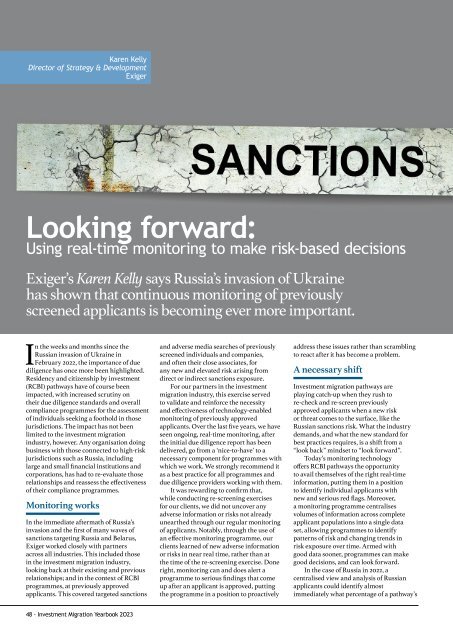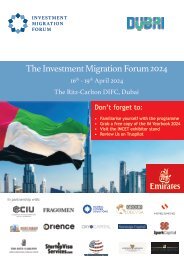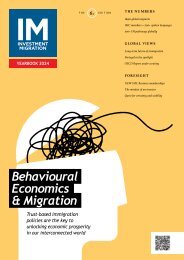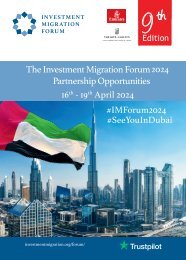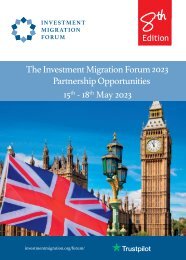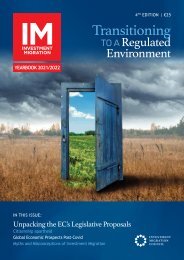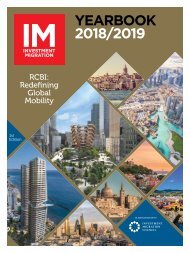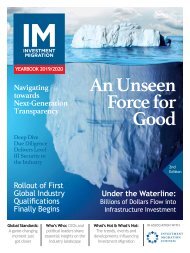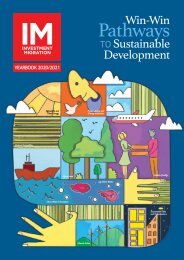IM Yearbook 2023
The completely new IM Yearbook 2023 is the 5th edition of what is now known as the most anticipated guide of the Investment Migration industry. The IM Yearbook is the essential global reference tool for the industry by the industry. Offering unrivaled valuable access to a prime targeted readership of your partners, clients and potential new business сontacts. Decision-makers in more than 54 countries trust the publication as a reputable source of information and guide. Readership includes: agents, law firms, advisory firms, banks, wealth managers, service providers, policy makers, government staffers, international organisations, and academics. Providing comprehensive, in-depth information about the global Investment Migration industry, the IM Yearbook 2023 will offer readers a practical A-Z guide to the current business operating environment while also highlighting the depth and breadth of practitioners, programmes, and their partners of all types.
The completely new IM Yearbook 2023 is the 5th edition of what is now known as the most anticipated guide of the Investment Migration industry.
The IM Yearbook is the essential global reference tool for the industry by the industry. Offering unrivaled valuable access to a prime targeted readership of your partners, clients and potential new business сontacts. Decision-makers in more than 54 countries trust the publication as a reputable source of information and guide. Readership includes: agents, law firms, advisory firms, banks, wealth managers, service providers, policy makers, government staffers, international organisations, and academics.
Providing comprehensive, in-depth information about the global Investment Migration industry, the IM Yearbook 2023 will offer readers a practical A-Z guide to the current business operating environment while also highlighting the depth and breadth of practitioners, programmes, and their partners of all types.
You also want an ePaper? Increase the reach of your titles
YUMPU automatically turns print PDFs into web optimized ePapers that Google loves.
<strong>IM</strong> YEARBOOK<br />
Karen Kelly<br />
Director of Strategy & Development<br />
Exiger<br />
Looking forward:<br />
Using real-time monitoring to make risk-based decisions<br />
Exiger’s Karen Kelly says Russia’s invasion of Ukraine<br />
has shown that continuous monitoring of previously<br />
screened applicants is becoming ever more important.<br />
In the weeks and months since the<br />
Russian invasion of Ukraine in<br />
February 2022, the importance of due<br />
diligence has once more been highlighted.<br />
Residency and citizenship by investment<br />
(RCBI) pathways have of course been<br />
impacted, with increased scrutiny on<br />
their due diligence standards and overall<br />
compliance programmes for the assessment<br />
of individuals seeking a foothold in those<br />
jurisdictions. The impact has not been<br />
limited to the investment migration<br />
industry, however. Any organisation doing<br />
business with those connected to high-risk<br />
jurisdictions such as Russia, including<br />
large and small financial institutions and<br />
corporations, has had to re-evaluate those<br />
relationships and reassess the effectiveness<br />
of their compliance programmes.<br />
Monitoring works<br />
In the immediate aftermath of Russia’s<br />
invasion and the first of many waves of<br />
sanctions targeting Russia and Belarus,<br />
Exiger worked closely with partners<br />
across all industries. This included those<br />
in the investment migration industry,<br />
looking back at their existing and previous<br />
relationships; and in the context of RCBI<br />
programmes, at previously approved<br />
applicants. This covered targeted sanctions<br />
and adverse media searches of previously<br />
screened individuals and companies,<br />
and often their close associates, for<br />
any new and elevated risk arising from<br />
direct or indirect sanctions exposure.<br />
For our partners in the investment<br />
migration industry, this exercise served<br />
to validate and reinforce the necessity<br />
and effectiveness of technology-enabled<br />
monitoring of previously approved<br />
applicants. Over the last five years, we have<br />
seen ongoing, real-time monitoring, after<br />
the initial due diligence report has been<br />
delivered, go from a ‘nice-to-have’ to a<br />
necessary component for programmes with<br />
which we work. We strongly recommend it<br />
as a best practice for all programmes and<br />
due diligence providers working with them.<br />
It was rewarding to confirm that,<br />
while conducting re-screening exercises<br />
for our clients, we did not uncover any<br />
adverse information or risks not already<br />
unearthed through our regular monitoring<br />
of applicants. Notably, through the use of<br />
an effective monitoring programme, our<br />
clients learned of new adverse information<br />
or risks in near real time, rather than at<br />
the time of the re-screening exercise. Done<br />
right, monitoring can and does alert a<br />
programme to serious findings that come<br />
up after an applicant is approved, putting<br />
the programme in a position to proactively<br />
address these issues rather than scrambling<br />
to react after it has become a problem.<br />
A necessary shift<br />
Investment migration pathways are<br />
playing catch-up when they rush to<br />
re-check and re-screen previously<br />
approved applicants when a new risk<br />
or threat comes to the surface, like the<br />
Russian sanctions risk. What the industry<br />
demands, and what the new standard for<br />
best practices requires, is a shift from a<br />
“look back” mindset to “look forward”.<br />
Today’s monitoring technology<br />
offers RCBI pathways the opportunity<br />
to avail themselves of the right real-time<br />
information, putting them in a position<br />
to identify individual applicants with<br />
new and serious red flags. Moreover,<br />
a monitoring programme centralises<br />
volumes of information across complete<br />
applicant populations into a single data<br />
set, allowing programmes to identify<br />
patterns of risk and changing trends in<br />
risk exposure over time. Armed with<br />
good data sooner, programmes can make<br />
good decisions, and can look forward.<br />
In the case of Russia in 2022, a<br />
centralised view and analysis of Russian<br />
applicants could identify almost<br />
immediately what percentage of a pathway’s<br />
48 - Investment Migration <strong>Yearbook</strong> 2O23


